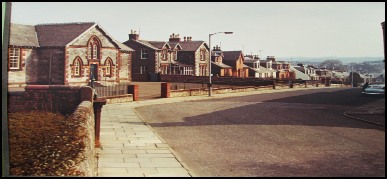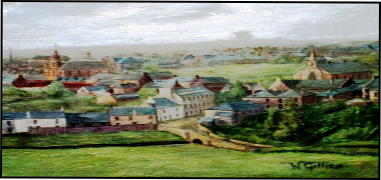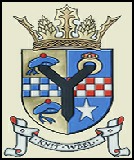Stewarton & District Historical Society Scottish Charitable Incorporated Organisation : SC011194.

Dunlop Street 1970D

Stewarton Viaduct 2008
Coat of Arms reproduced by permission of Stewarton Community Council

Springwell Place 1860

Site produced by
“Davie McKie’s Web Designs.”
Updated
26th January 2024
F -
Ian’s A -
If you really want a legend, visit Glamis Castle where the Guild informed us that Shakespeare got his idea for Macbeth when he visited Glamis on his way to Aberdeen!!
“FRISKIN”
This month's letter 'F' takes us back into the Dark Ages, to the time of Macbeth to be exact.
In 1040 King Duncan led a force against Macbeth, but was killed and buried at Elgin (later buried on Iona.)
Duncan's son was Malcolm Canmore (great chief -


Malcolm then tried to reach temporary safe refuge in southern Scotland.
This is where the legend part starts.
Local tales say that he owned the castle of Corsehill (also Crosshill) outside Stewarton, but evidence is sadly lacking on this.
The story then goes that MacBeth's men were almost upon Malcolm when he saw a peasant called Friskin (or Friskine), turning hay in a field nearby. Friskin was persuaded to hide Malcolm Canmore by covering him with hay until the danger passed.
Malcolm then escaped to England with Friskin as a retainer. King Harthacanute of England (and Norway) gave them protection. When Harthacanute died, his successor King Edward the Confessor gave Malcolm an army which permitted him to conquer Scotland and kill King Macbeth in 1057.
The grateful King Malcolm III then gave Friskin the Thanedom, or Bailliery, of Cuninghame and the family took this name, together with the motto of 'Over Fork Over' which they retain to this day.
So this explains why we have a Canmore Place in Stewarton, whether the story be true or not, but
no-

Another version of the story stated by Frederick van Bassen, a learned Norwegian,is that the saviour of Malcolm was actually a Malcolm, son of Friskin, however in other respects the story is the same.
The first recorded Freskin in Scotland was granted lands in Morayshire and is supposed to be the founder of Friskin or Freskin which is a Flemish name and many Flemings were granted lands in Scotland in the early days of feudalism.



King Harthacanute